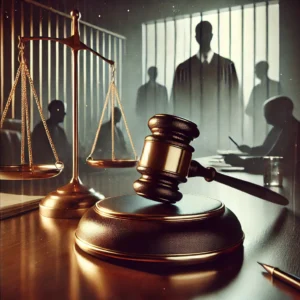Grand Jury Indictment Meaning & Why You Need Defense Lawyers Immediate Legal Help
 For federal government contractors, healthcare executives, and individuals facing allegations of government contract fraud, PPP loan fraud, or healthcare fraud, a federal grand jury indictment is a life-altering event. The fear, uncertainty, and potential consequences of being charged with a crime are overwhelming, but it’s important to remember: being indicted does not mean you are guilty of a crime.
For federal government contractors, healthcare executives, and individuals facing allegations of government contract fraud, PPP loan fraud, or healthcare fraud, a federal grand jury indictment is a life-altering event. The fear, uncertainty, and potential consequences of being charged with a crime are overwhelming, but it’s important to remember: being indicted does not mean you are guilty of a crime.
Understanding the implications of a grand jury indictment and acting quickly by hiring an experienced federal criminal defense attorney can make all the difference in your case.
What Is a Grand Jury Indictment?
A federal grand jury indictment is a formal charge issued after a grand jury determines there is enough evidence (probable cause) to prosecute you or your company for a federal crime. Grand jury proceedings are held in secret, and you generally are not present, nor is your defense attorney.
This process often feels one-sided because only the prosecutor presents evidence. The grand jury doesn’t determine guilt or innocence—they only decide whether the case against you should move forward to trial. That is it
What Does a Grand Jury Indictment Mean for You?
- It Is Not a Conviction: An indictment means charges have been filed, but the prosecution still must prove its case at trial.
- Probable Cause vs. Beyond a Reasonable Doubt: The standard for indictment is much lower than the standard for conviction at trial.
- The Government Is Building Its Case: Indictments often signal that federal prosecutors are confident in their evidence, but it doesn’t mean their case is guaranteed to win at trial.
FAQs What Are Your Common Concerns After a Grand Jury Indictment?
If you’ve been indicted by a grand jury, you’re likely trying to figure out answers to several fears and questions. You have valid concerns, and addressing them head-on is critical to taking your next step.
- Will You Go to Prison? An indictment does not guarantee a conviction or prison time. With a strong defense, criminal charges can be reduced, dismissed, or disproven at a criminal trial. Acting early by hiring a federal criminal defense attorney can give you the best chance to avoid prison if you are facing government contract fraud, False Claims Act, PPP loan fraud or healthcare fraud charges
- How Will This Affect My Career and Reputation? For professionals like government contractors or healthcare executives, an indictment can damage your reputation and business future. Taking prompt legal action can help mitigate these effects by demonstrating that you are proactively addressing the charges.
- Can I Fight the Charges? Yes, you can. Many cases that lead to indictments involve misunderstandings, accounting errors, or misinterpretations of complex regulations. An aggressive defense attorney will dissect the evidence and challenge the prosecution’s narrative.
Why You Shouldn’t Wait Until Trial to Hire a Defense Attorney
Delaying legal representation is one of the biggest mistakes you can make after a grand jury indictment. Here’s why:
- Early Defense Is Key: A defense attorney can begin working immediately to analyze the charges, identify weaknesses in the government’s case, and develop strategies to protect your interests. In some cases, early intervention may even prevent charges from being filed.
- Protecting Your Rights: After an indictment, every action you take is under scrutiny. A defense attorney ensures you don’t inadvertently incriminate yourself or make mistakes that could harm your case.
- Building a Strong Case Takes Time: Federal cases are complex, often involving extensive documentation and technical regulations. The sooner your attorney begins gathering evidence, consulting experts, and crafting your defense, the better your chances of success.
Grand Jury Indictments for Fraud Cases: What to Expect
Federal fraud charges often lead to grand jury indictments. Here’s what you need to know about the most common types of fraud cases:
- Government Contract Fraud: Accusations of overbilling, misrepresentation, or falsifying records are common in federal contracting. Many cases arise from regulatory misunderstandings rather than intentional wrongdoing.
- PPP Loan Fraud: Prosecutors have been aggressively pursuing cases involving the misuse of pandemic relief funds. Often, these cases are built on incomplete evidence or misinterpretation of how funds were used.
- Healthcare Fraud: From allegations of kickbacks to billing irregularities, healthcare fraud cases are highly complex. Understanding healthcare regulations and compliance is crucial to building a strong defense.
Frequently Asked Questions About Grand Jury Indictments
If you’ve been notified of a grand jury indictment, it’s natural to have pressing questions and concerns about what comes next. Below, we’ve compiled answers to some of the most common questions our clients ask when facing federal charges.
- What is a grand jury indictment?
A grand jury indictment is a formal accusation that there is enough evidence to charge you with a federal crime. It means the government believes it has probable cause to proceed with prosecution. However, it does not mean you are guilty or will be convicted.
- How is a grand jury indictment different from being arrested?
An indictment is a formal charge that often occurs before an arrest. While an arrest requires immediate action, an indictment signals that prosecutors have been building a case against you, often for months or longer.
- Will I go to jail immediately after an indictment?
Not necessarily. After an indictment, you may receive a summons to appear in court or face an arrest warrant. If arrested, you may be eligible for bail or release on certain conditions while your case proceeds.
- Do I need to hire a defense attorney if I’ve been indicted?
Yes. An indictment is a serious legal matter, and federal prosecutors are often aggressive in pursuing convictions. Hiring an experienced criminal defense attorney immediately ensures your rights are protected and gives you the best chance to challenge the charges.
- What should I do if I’ve been indicted?
- Do not speak to law enforcement or prosecutors without an attorney present.
- Contact a criminal defense attorney experienced in federal cases.
- Avoid discussing your case with anyone other than your attorney.
- Does being indicted mean I’m guilty?
No. A grand jury indictment only means there is probable cause to charge you. The prosecution must still prove your guilt beyond a reasonable doubt in court.
- What types of evidence are used in a grand jury indictment?
Prosecutors may present financial records, emails, witness testimony, or other documentation to the grand jury. However, the evidence is not cross-examined, and you don’t have the opportunity to present your side of the story at this stage.
- How long does the process take after an indictment?
The timeline can vary, but after an indictment, you will typically face arraignment, pre-trial motions, and potentially a trial. Some cases are resolved through negotiations, while others go to trial. An experienced attorney can help you navigate the timeline and prepare your defense.
- What are the potential penalties if I’m convicted?
Penalties for federal charges vary depending on the crime and circumstances but may include:
- Prison time.
- Significant fines.
- Restitution payments.
- Probation or supervised release.
- Loss of professional licenses or business privileges.
- Can the charges be dismissed after an indictment?
Yes, charges can be dismissed if your defense attorney successfully challenges the evidence, proves procedural errors, or demonstrates that the prosecution lacks sufficient evidence to proceed.
- Can I negotiate with prosecutors after being indicted?
Yes. In many cases, your defense attorney can negotiate with prosecutors to reduce charges, secure a plea agreement, or even dismiss the case. Early legal representation is critical to these negotiations.
- What are my next steps after an indictment?
- Hire an experienced federal defense attorney immediately.
- Follow your attorney’s guidance and avoid making any statements or decisions without their advice.
- Prepare for the legal process, which may include appearing in court, providing documentation, and attending strategy sessions with your attorney.
If you’ve been indicted or have concerns about a federal investigation, we’re here to help. Contact us today for a confidential consultation to discuss your options and start building your legal defense.
How Our Grand Jury Indictment Lawyers Can Help You Navigate Your Case
When you’re facing a grand jury indictment, time is of the essence. Here’s how we assist clients in these high-stakes situations:
- Comprehensive Case Analysis
We thoroughly review the indictment, the evidence presented, and the circumstances surrounding your case to identify weaknesses in the prosecution’s argument.
- Building a Tailored Defense Strategy
Every case is unique. We develop customized defense strategies designed to challenge the government’s case and protect your future.
- Protecting Your Rights at Every Step
From the initial stages of the indictment to pre-trial motions and, if necessary, trial, we ensure your rights are safeguarded and that you have the support you need.
Take Action Now to Protect Your Future
A grand jury indictment is a serious matter, but it’s not the end of the road. The choices you make now will impact the rest of your life. Hiring a defense attorney early gives you the best chance to avoid a conviction, reduce charges, or even have the case dismissed.
Contact Us Today for a FREE Confidential Consultation
Don’t wait. Time is critical when facing federal criminal charges. Call us now at 1.866.601.5518 to discuss your case and start building a defense strategy tailored to your needs. Speak directly to Theodore P. Watson or contact us online.
Your future is too important to leave to chance—take the first step toward protecting it today.
